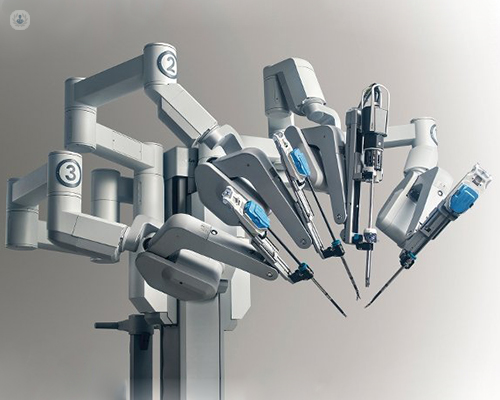Robotic surgery on kidneys: the main benefits explained
Written by:Robotic surgery has quickly become a trusted and highly effective way of performing surgical procedures, and can be carried out as a treatment option for a host of medical problems, including kidney disease or the removal of kidney tumours.
In our latest article, Mr Aniruddha Chakravarti, explains how exactly robotic surgery is performed on the kidneys, and outlines the main benefits of robotic surgery.

When it comes to the kidneys, how exactly is robotic surgery performed?
Robotic surgery is usually performed in a semi-lateral position in the kidneys. Some ports are positioned in the patient’s abdomen, the robotic arms are positioned through these ports and the instruments are passed.
Then, the surgeon works the robot through a console. The surgeon’s assistant will be at the patient’s side, and there will typically be one or two ports for the assistant.
The robot does not perform the surgery itself, instead it works on a master-slave principle. The master is the surgeon operating the console, and the robot is the slave. The robot does exactly what the surgeon wants it to do.
What are the main benefits of robotic surgery being performed on the kidneys?
When it comes to the kidneys, robotic surgery offers a big advantage. The robot helps the surgeon enormously due to the fact that, firstly, it is incredibly efficient, and secondly, it enables the surgeon to have a much higher degree of vision. The robotic camera is a 3D camera, so the surgeon can have 3D, immersive vision.
Who is the ideal candidate?
There is no ideal candidate, really. Robotic surgery is highly effective for all kinds of surgeries. The more complex the surgery, the better it is to perform it robotically. For example, if you want to remove a tumour from the kidney and want to save the kidney, you certainly need a high degree of precision.
Again, if you want to reconstruct a kidney, precise dissecting is necessary, so robotic surgery is extremely useful and effective for this.
What are the potential risks and side effects of robotic surgery?
There are, unfortunately, some risks involved. The main ones include the following:
- bleeding
- bowel injury
- bruising
What is recovery time like?
Recovery from robotic surgery is much, much faster than traditional, open surgery.
Mr Aniruddha Chakravarti is a highly esteemed and experienced consultant urologist who can offer you expert medical guidance and opinion when it comes to robotic surgery. Contact him today to book an appointment with him via his Top Doctors profile.


